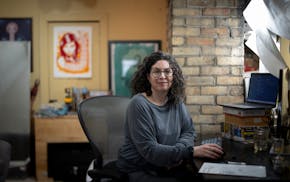As a lad growing up on a coffee farm in the Comayagua mountains of Honduras, Guillermo Velasquez and his brothers herded a dozen coffee-laden mules up and over four mountain passes on the roadless, 2-mile trek to the little town of La Palma, where his father maintained a storage facility.
Years later, Velasquez was schlepping coffee again, but this time he was flying from Honduras to his St. Paul home loaded with eight suitcases -- as many as he, his wife and three children could carry -- crammed with coffee beans.
"My father told me he would have to give up the farm because of the drop in coffee prices around the world," said Velasquez, 41. "So I thought I could bring some coffee back and sell it for a higher price."
Before you could say French Roast Whole Bean, however, sales to friends and co-workers had blossomed via word of mouth into Velasquez Family Coffee, a St. Paul company with an uncommon business model.
Since 2001, the home-based business has been importing coffee grown by Guillermo's family and selling it via a subscription service that delivers monthly orders to more than 100 customers. Most are personal deliveries, although some are sent via mail order.
It has been a long and difficult journey that has yet to yield a revenue stream large enough to allow Velasquez and his wife, Cathy, to devote full time to the business.
Nonetheless, trends are positive: A $61,500 gross in 2008 was up 60 percent from sales of $38,600 two years earlier. And while the recession has had an impact, sales so far in 2009 are up more than 1 percent.
All of which allowed Cathy Velasquez, 41, to shift recently to a part-time schedule at her outside job and focus more on the coffee operation. Guillermo continues full time as a plant researcher at the University of Minnesota.
The coffee beans, hand-picked, hulled and sun-dried in Honduras and roasted by a company in Le Center, Minn., cost $8.50 for a 12-ounce package, competitive with supermarket prices.
There are several aspects of the business that appeal to subscribers. First, there's the family connection that takes the product "direct from the producer to us to the coffee drinker," as Cathy Velasquez put it.
Gourmet on a budget
It's an appealing factor, said Tom Bedard, a teacher at Highland Early Childhood Family Education in Highland Junior High School: "I know the people I'm buying from. That is huge in a world where there are business models that create such things as securitized mortgages," he said.
Then there's the product itself, which Mike and Kathy Eischen described in an e-mail as "very sharp no bitter notes." The monthly delivery "is freshly roasted, about as fresh as could be purchased," they wrote. "We think of it as gourmet on a budget."
Equally attractive are the "Fair Trade" and "green" aspects of the business. The coffee is raised without pesticides or chemical fertilizers, and the St. Paul company pays $2.20 a pound for the beans, well above the $1.55 standard set by TransFair USA, a nonprofit that promotes fair trade and establishes target prices.
Jane Flannigan, who works at Most Holy Trinity Catholic Church in St. Louis Park, said this is one reason that Velasquez coffee was chosen to sell as a fundraiser for church mission trips to Honduras.
"Buying Fair Trade coffee is a small but significant way to put the values of Catholic social teachings into action," said Flannigan.
Agreement came from Richard Raschio, associate professor of modern and classical languages at the University of St. Thomas and a longtime subscriber: "This family is a living example of the good that the fair-trade coffee concept can do for small, independent farmers."
The above-average payment to producers and competitive retail price are possible, in part, because there are no middlemen. Shipping costs are low, despite limited quantities, because a cousin of Velasquez's with a large coffee business in Virginia includes the St. Paul company's imports with his.
The Velasquezes met in Florida when Guillermo was visiting an aunt and Cathy was living next door as a United Methodist Church volunteer.
They married in 1991 and moved to the Twin Cities, where he earned a degree in animal and plant systems at the University of Minnesota and his wife took a master's in public affairs at the U's Humphrey Institute.
They have plenty of competition in their coffee niche, notably the multimillion-dollar Peace Coffee operation, which imports, roasts and wholesales beans to retailers and restaurants hereabouts. Other, smaller operations sell to stores and restaurants and one markets product at a farmer's market.
"We tried to do it wholesale, but it didn't take off," Cathy Velasquez said. So they opted for the once-a-month subscription model, which fit well with their jobs. It created predictable sales because subscribers sign up to have a specific amount delivered, although orders can be altered month to month.
The Velasquezes promote their product at the annual Living Green Expo in St. Paul, via their website and at an eBay store they opened. But the bulk of the business comes by word of mouth, they said.
"When we started, we never thought it would get big enough to make a living," she said. "But now we see the potential.
"It's been a real adventure for us."
Dick Youngblood • 612-673-4439 • yblood@startribune.com
Stock market today: Wall Street slides in premarket as airlines, Big Tech report earnings
Southwest will limit hiring and drop 4 airports after loss. American Airlines posts 1Q loss as well
Venice tests a 5-euro entry fee for day-trippers as the city grapples with overtourism
